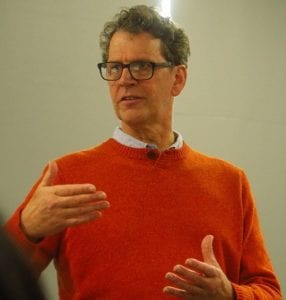 One of the frontiers in the UK, Dr. Paul Jepson outlined his journey engaging with the process of rewilding, beginning in 2005, when he heard about work being undertaken in the Netherlands.
One of the frontiers in the UK, Dr. Paul Jepson outlined his journey engaging with the process of rewilding, beginning in 2005, when he heard about work being undertaken in the Netherlands.
Rewilding is the process of restoring ecosystem dynamics and function at various levels; it can be condensed into the ‘3 C’s’;
- Securing core areas
- Connecting these core areas
- Re-introducing large carnivores
The loss of micro-habitat diversity due to the reduction of megafauna and large herbivores brings into focus the severe need to restore ecosystem function around the world on a large scale. Rewilding has been suggested as a solution to this. It aims to generate new natures that are ecologically richer than those before. As Paul said – it’s all about moving forward.
The study and application of rewilding has become much more prevalent in recent years with many articles and scientific papers being released on the subject. Despite being still in its relative infancy, there are many current cases of rewilding such as species reintroduction in the UK and the development of hybrid ecosystems in Australia.
The development of rewilding may signify a new environmental narrative in which people can readily challenge governments to take actions to change the recovery and wellness in nature to surpass previous standards. Dr. Jepson’s narrative structure of ‘Recoverable Earth’, in which recovery of the environment was the final outcome, was a refreshing notion.
Paul spoke briefly about the rewilding poster child project in Nijmegen in the Netherlands:
This project was highly successful and created a huge diversity of habitats within the small area which boosted the public opinion of the scheme. Dr Jepson also spoke about the vast socio-economic benefits of rewilding with its positive impact on property values, life quality and job opportunities in Nijmegen.
Controversies surrounding rewilding included the mention of the starvation of large herbivores that were reintroduced into the Oostvaarderplassen nature reserve and the consequent public outrage in the Netherlands. Paul spoke about ‘kept wild’ animals in rewilding schemes as wild animals under management by humans (as is the norm in Southern Africa) being the most viable way to tackle current restrictions faced by domesticated animal laws; such the legal requirement to remove a carcass of a domestic animal within 3 days of death. This restricts the processes associated with carcass and scavenger ecology, which in turn restricts trophic expansion within the rewilding environment. De-domestication policies are being thought up that will enable rewilding schemes to have maximum success in trophic expansion through carcasses of ‘kept wild’ animals being reintroduced into food chains.
The seminar was closed with some thoughts on the future of rewilding. Paul spoke about the exciting future projects that rewilding has to offer and the likelihood that they will interlink with advances in technologies within the ever-expanding areas of biological sciences.
Written by Nina Blampied (year 2 Zoology BSc)


